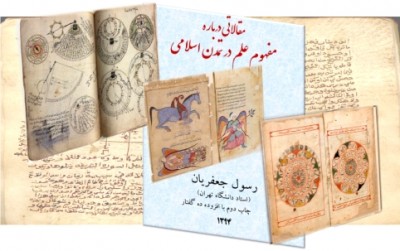Dr. Rasoul Jafarian is mostly known as an outstanding scholar in Shiite studies; however, his new book entitled Mafhum-e Elm dar Tamadon-e Eslam (The Notion of Science in the Islamic Civilization) in Persian introduces him as a prominent scholar in the History of Science. The first edition of this book was introduced on this website. The second edition revises the last 17 articles and includes ten new papers. The chapters of this book are as follows:
| The Concept of Science in the Islamic Civilization, the case study of Ajayeb al-Makhluqat
| Amr ibn Bahr Jahiz and the Scientific System in the 10th Century
| All Sciences and the One Science, Ibn Hazm’s Viewpoints in the Classification of Different Fields of Science
| The Concept of Science in Traditional Medicine, Abul Hassan Ameri, and Classifications of Science, Nafa’es Al-Fonun and the Concept of Science and its Classification,
| Rationalism and Narration between Abu Hatim Razi and Zakariya-ye Razi
| The Concept of Superstition in Medieval Islamic Sources
| Seyed Morteza and the Review of Hadiths on Animals and Birds
| Astronomical Principles and the Rational Confusion in the Islamic Civilization
| The Viewpoints of the Safavid Scientists about Astronomical Principles
| Religious and Non-Religious Sciences in Qazali Thoughts
| Learning Science and its Progress
| Learning Science as a Private or General Responsibility
| Ibn Sa’ed Andolosi and the Concept of Science in the Islamic Civilization
| Maqdasi’s Perspective on the Concept of Science
| Ibn Hazm Andolosi and Historical Examination, Scientific Methods of Evaluation in History
| Alchemy and the Notion of Knowledge in the Islamic Civilization
| Where are Jabolka and Jabolsa
| The Negative Experience of Islamization of Astronomy
| Naser Khosrow and his Religious Philosophy
| The Euphrates: A River in the Heaven or the Gold Treasure of the ISIS
| How were Different Branches of the Occult Science Developed?
| Dala’el al-Qebla an Astronomical-Geographical Study in the 10th Century
| Expedition in Search of the Dam of Gog and Magog
| Yaqut Hamavi and the Criticism of Geographical Information
| Controversy over the Science of Medicine in the Islamic Civilization, A Case Study on Meftah al-Elm
| Rashid al-Din Fadl al-Allah Hamedani’s Viewpoints about the Notion of Certainty
| Intellectual Disputes of Theologians and Rationalists on Scientific Problems in Medieval Times
| The Status of Ordinary People in our Religious Texts
The simple eloquent language of the book and the straightforward methodology that the author applies to lead the reader directly to the main ideas of the book. The author examines different primary sources in Persian and Arabic to trace the notion of science in medieval times. Using manuscripts as one of the main sources of his work amplifies the significance of Jafarian’s contribution to medieval studies.
In his introduction, the author specifies his definition of science as “an epistemic wisdom constructing the thinking system of society in the framework of culture and civilization” (p. 8). So by science, he means all aspects of human thinking including literature, philosophy, history, religion, astronomy, and geography.
However, undetermined boundaries of science, quasi-science, and epistemology in medieval times are one of the main challenges of the studies on the history of science.
Throughout all articles, Jafarian attempts to shed light on the notion of science in general and different fields of medieval science in particular. Unlike many works that overemphasize the glorious aspects of the Islamic civilization, the author applies a critical methodology to approach different primary sources on medieval science. He argues that approaching the methodology of religious studies in different fields of science including astronomy, alchemy, medicine, and geography hindered the Muslim’s progress in the world of science.
You can read the complete Book Review in the Persian Section of the Website.
Maryam Kamali

